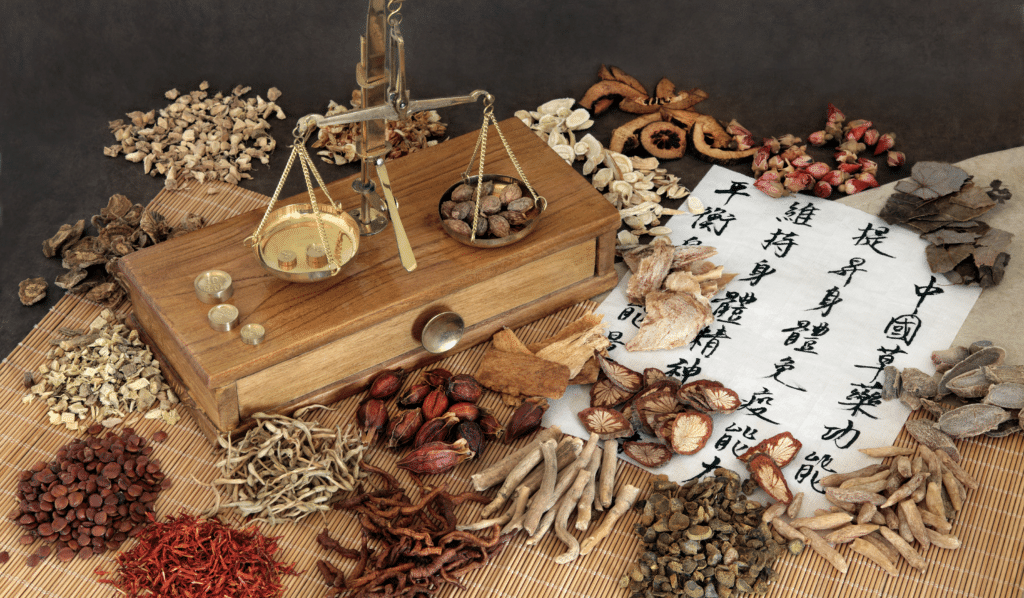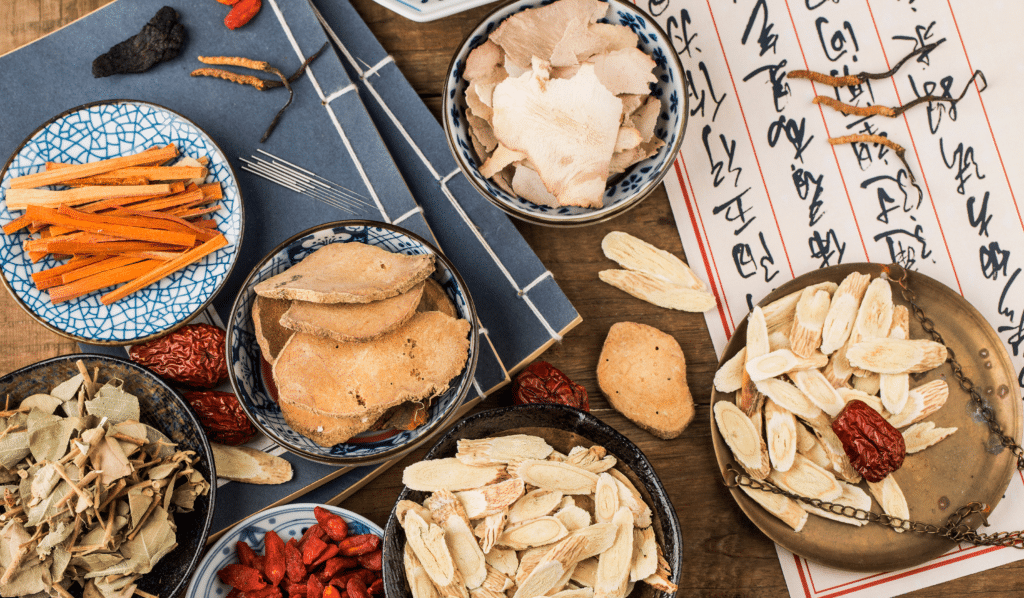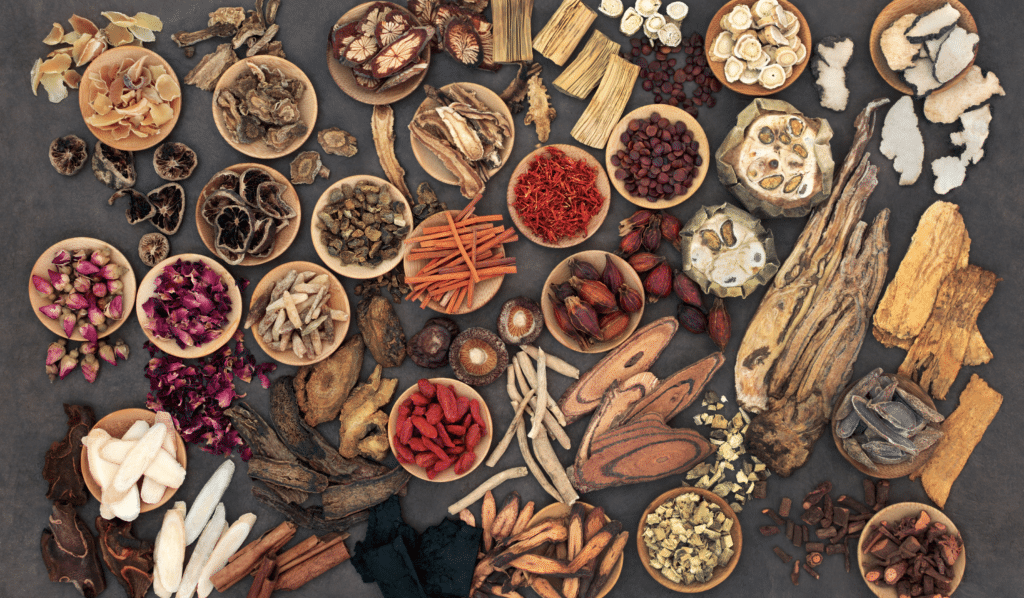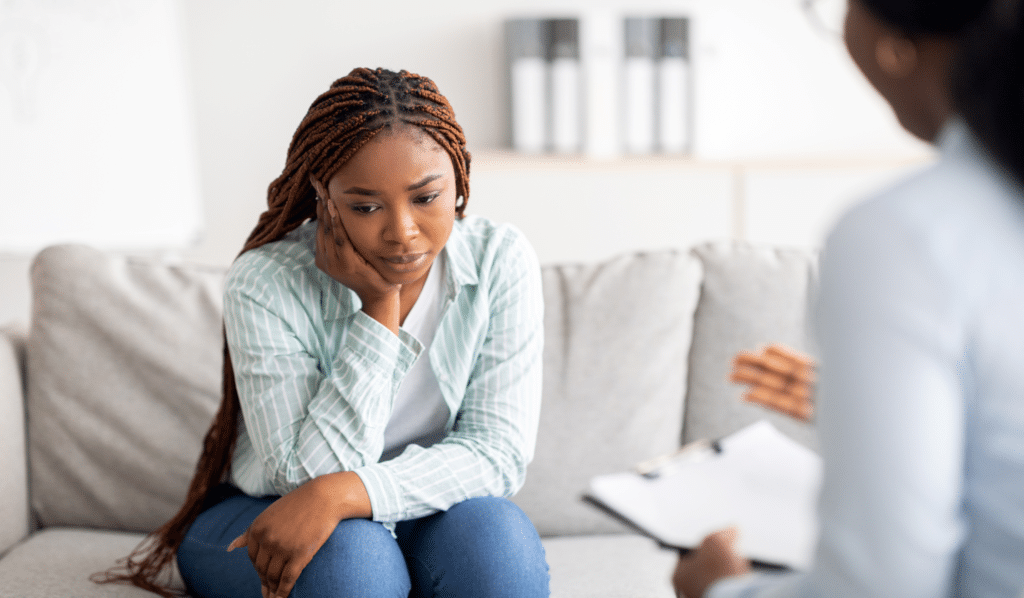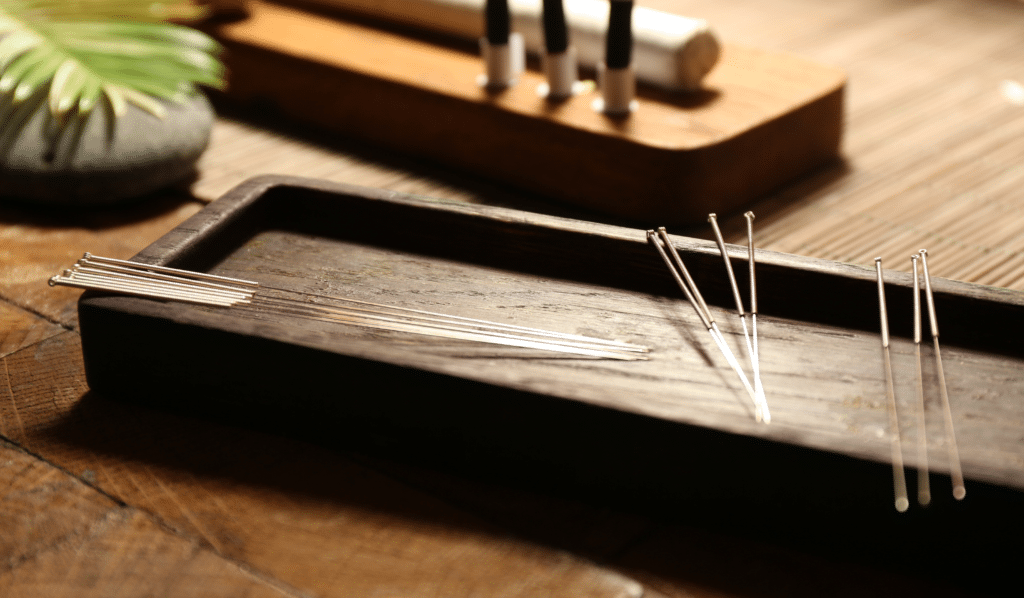Traditional Chinese Medicine for Anxiety
Is your heart racing? Thoughts spiraling? Anxiety can feel relentless, with worries stacking up faster than they can be managed. It might be the weight of daily responsibilities, the pressure to keep everything in order, or that persistent uneasy feeling that something is not quite right. Whatever the cause, it can be overwhelming both mentally and physically.
Traditional Chinese Medicine recognizes that anxiety is not just in the mind. It affects the entire body, influencing sleep, digestion, and overall energy levels. In TCM, anxiety is seen as an imbalance in the natural flow of Qi, disrupting emotional and physical well-being. Instead of simply masking symptoms, acupuncture, herbal medicine, and time-honored lifestyle practices work to restore balance at the source. With a holistic approach, TCM helps quiet the mind, ease tension, and support lasting stability.
Traditional Chinese Medicine for Anxiety
Is your heart racing? Thoughts spiraling? Anxiety can feel relentless, with worries stacking up faster than they can be managed. It might be the weight of daily responsibilities, the pressure to keep everything in order, or that persistent uneasy feeling that something is not quite right. Whatever the cause, it can be overwhelming both mentally and physically.
Traditional Chinese Medicine recognizes that anxiety is not just in the mind. It affects the entire body, influencing sleep, digestion, and overall energy levels. In TCM, anxiety is seen as an imbalance in the natural flow of Qi, disrupting emotional and physical well-being. Instead of simply masking symptoms, acupuncture, herbal medicine, and time-honored lifestyle practices work to restore balance at the source. With a holistic approach, TCM helps quiet the mind, ease tension, and support lasting stability.
Key Takeaways
-
Traditional Chinese Medicine treats anxiety by restoring the flow of Qi, addressing emotional and physical imbalances holistically.
-
Acupuncture calms the nervous system and regulates stress hormones, helping reduce anxiety symptoms naturally and effectively.
-
Chinese herbal formulas like Xiao Yao San and Albizia bark support emotional balance, targeting root imbalances instead of masking symptoms.
-
Dietary therapy in TCM promotes mental clarity and emotional stability, using warming foods, probiotics, and magnesium-rich ingredients.
-
Mind-body practices such as Qi Gong and acupressure ease tension and overthinking, making them valuable tools for daily anxiety relief.
The TCM Perspective: How Anxiety Is Understood in Traditional Chinese Medicine
Traditional Chinese Medicine views anxiety as more than just a mental state. It reflects an internal imbalance that disrupts the body’s natural energy flow. When Qi is not circulating properly, emotions become difficult to regulate, and physical symptoms often follow. Some feel anxiety as an unrelenting sense of restlessness, others experience it as tension or exhaustion, while some struggle with excessive worry and overthinking. Each experience is tied to a different organ system, and understanding these patterns helps guide treatment toward restoring balance.
Key Syndromes Associated with Anxiety
Heart and Shen (Spirit) Imbalance
Some forms of anxiety create a sense of internal restlessness that never fully subsides. The mind races, sleep becomes fragmented, and even in moments of calm, there is a lingering unease. Traditional Chinese Medicine connects this to the Heart, which houses the Shen, or Spirit. When this system is weakened, thoughts feel scattered, emotions feel unstable, and physical symptoms like palpitations, insomnia, and difficulty concentrating can develop. Strengthening the Heart and nourishing the Shen through acupuncture, herbal remedies, and calming practices helps restore a sense of inner steadiness.
Liver Qi Stagnation
Emotional tension that builds over time can create a different kind of anxiety. Irritability, frustration, and mood swings become more frequent, while physical discomfort like tightness in the chest, headaches, or digestive issues may appear. The Liver is responsible for the smooth flow of Qi, but when stress and emotional suppression cause stagnation, the body and mind feel stuck. Treatment focuses on releasing this built-up tension, encouraging Qi to move freely again through acupuncture, herbal medicine, and lifestyle adjustments that reduce stress and promote emotional expression.
Kidney and Adrenal Deficiency
Some experience anxiety as a constant sense of depletion, as if energy is running low and the body can no longer keep up. There may be persistent worry, dizziness, cold extremities, and a feeling of vulnerability. The Kidneys store the body’s vital essence, and when this energy is drained by chronic stress or overwork, anxiety can feel deeply rooted in exhaustion. Strengthening the Kidney system focuses on restoring resilience, using acupuncture, nourishing foods, and supportive herbs to rebuild the body’s reserves and create a foundation of lasting stability.
Spleen Qi Deficiency
Anxiety that centers around excessive overthinking, mental fog, and digestive discomfort often points to the Spleen. This system plays a key role in processing both food and thoughts, and when it becomes weak, worry becomes excessive and digestion slows. Symptoms like bloating, nausea, poor appetite, and difficulty focusing are common. Strengthening the Spleen helps regulate both the body and mind, using acupuncture, dietary therapy, and herbal medicine to improve digestion, boost energy, and ease anxious thoughts.
Although anxiety presents in different ways, the underlying cause is always an internal imbalance that can be addressed. Traditional Chinese Medicine offers a path toward relief by restoring harmony in the body, calming the mind, and supporting long-term emotional well-being.
Acupuncture for Anxiety
Acupuncture is widely recognized for its ability to regulate the nervous system, reduce stress hormones, and promote overall relaxation. While many well-known acupuncture points are used for anxiety relief, lesser-known yet highly effective points can offer deeper emotional and physical benefits.
- Yin Tang (Third Eye Point) – Located between the eyebrows, this point is known for its immediate calming effect. It soothes the nervous system, reduces overthinking, and alleviates stress-related tension in the face and head.
- Shen Men (Heart Gate) in the Ear – This auricular acupuncture point is a powerhouse for emotional stability. It helps reduce anxiety, improve sleep, and promote a sense of overall well-being.
- An Mian (Peaceful Sleep) – Found behind the ear, An Mian is commonly used for sleep disorders related to anxiety. It quiets an overactive mind, making it easier to achieve deep, restorative rest.
- Pericardium 6 (Inner Gate) – Located on the inner forearm, this point is especially helpful for individuals who experience anxiety as chest tightness, palpitations, or nausea. It soothes the heart and harmonizes the emotions.
Acupuncture also plays a key role in regulating cortisol and serotonin levels naturally. By activating the parasympathetic nervous system, acupuncture helps to reduce cortisol (the stress hormone) while promoting serotonin and dopamine production—both of which contribute to emotional balance and a greater sense of calm.
Chinese Herbs for Anxiety
In Traditional Chinese Medicine, herbs are not just used to suppress anxiety symptoms—they address the underlying imbalances that cause emotional distress. Instead of isolated remedies, herbal formulas are often prescribed to create a synergistic effect. Some of the most powerful yet underutilized herbs for anxiety include:
- Albizia (He Huan Pi) – Often called the “Tree of Happiness,” Albizia bark is known for its uplifting effects on mood. It reduces stress, enhances emotional resilience, and eases grief-related anxiety.
- Zizyphus (Suan Zao Ren) – A go-to herb for sleep-related anxiety, Zizyphus helps calm the Shen (spirit), support restful sleep, and improve emotional stability.
- Poria (Fu Ling) – This medicinal fungus is excellent for strengthening digestion and clearing dampness, which can contribute to mental fog and sluggishness in anxious individuals.
- Gastrodia (Tian Ma) – Particularly helpful for those experiencing dizziness, restlessness, or excessive worry. It stabilizes the nervous system and improves clarity of thought.
- Bupleurum (Chai Hu) – A key herb for Liver Qi stagnation, Bupleurum relieves tension, irritability, and stress-induced headaches.
Traditional Chinese Medicine emphasizes herbal formulas over single herbs for long-term anxiety relief. These carefully balanced combinations ensure that multiple aspects of emotional well-being are addressed, making them more effective in restoring internal harmony.
TCM Dietary Therapy for Anxiety: What to Eat and Avoid
Food is a cornerstone of TCM healing, and dietary choices significantly influence emotional balance. Certain foods can either calm or aggravate anxiety based on their energetic properties.
Foods that calm an overactive mind:
- Warming foods: Bone broth, red dates, and cooked vegetables support digestion and Qi flow, helping to stabilize emotions.
- Magnesium-rich foods: Seaweed, black sesame seeds, and walnuts relax the nervous system and ease muscle tension.
- Natural probiotics: Fermented foods, miso, and pickled vegetables promote gut-brain health, which plays a key role in emotional stability.
Foods that aggravate anxiety:
- Excess cold/raw foods: Weakens digestion, leading to dampness accumulation and excessive worry.
- Overconsumption of caffeine, alcohol, and greasy foods: Disrupts Qi flow and overstimulates the nervous system, making anxiety worse.
Breathwork and Qi Gong: TCM Energy Practices for Emotional Balance
Traditional Chinese Medicine incorporates energy-based practices to regulate the nervous system and restore emotional balance. Some lesser-known techniques include:
- Tian Gui Breath – A gentle breathing practice that strengthens the Heart and Kidney connection, fostering emotional resilience.
- 5-Element Qi Breathing – Aligns breathwork with the five elements, adjusting energy flow to alleviate anxiety.
Qi Gong movements for anxiety relief:
- “Swimming Dragon” – Releases Liver Qi stagnation and improves emotional fluidity.
- “Holding the Moon” – Grounds the mind, reducing overthinking and excessive worry.
Reflexology and Acupressure: Hands-On Anxiety Relief
Acupressure is a self-care technique that allows individuals to relieve anxiety in moments of stress. Specific points to focus on include:
- Pericardium 8 (Lao Gong) – Located in the center of the palm, this point is considered an emotional reset button, quickly easing stress and tension.
- Heart 7 (Shen Men on the wrist) – A powerful point for calming the spirit, reducing panic, and promoting relaxation.
- Liver 3 (Tai Chong on the foot) – Helps with frustration-based anxiety and emotional stagnation.
Reflexology zones on the feet also play a role in emotional balance, particularly the areas corresponding to the heart and kidneys, which are linked to anxiety in TCM.
Sleep and Anxiety: TCM Solutions for Restful Nights
Anxiety and poor sleep often create a cycle that worsens emotional distress. TCM offers natural strategies to promote deep and restorative sleep:
- Herbal teas: A combination of chrysanthemum and goji berry helps soothe Liver Qi before bedtime, reducing tension-related insomnia.
- Foot soaks with Mugwort (Ai Ye): Encourages deep relaxation by warming the channels and grounding energy before sleep.
- Liver massage before bed: A simple practice that supports natural melatonin production and eases nighttime restlessness.
Traditional Chinese Medicine provides a comprehensive approach to managing anxiety, addressing not just symptoms but the root imbalances that contribute to emotional distress. Whether through acupuncture, herbal medicine, dietary therapy, or energy-based practices, TCM offers time-tested solutions for restoring inner peace and lasting emotional well-being.
The Role of Traditional Chinese Medicine in Long-Term Anxiety Management
Traditional Chinese Medicine is not just about addressing immediate symptoms. It provides a foundation for sustainable emotional balance by targeting the root causes of anxiety. Through a holistic approach, TCM ensures that emotional well-being is supported from multiple angles, allowing individuals to maintain long-term stability and resilience.
How TCM Promotes Sustainable Emotional Balance
| TCM Approach | How It Supports Anxiety Management |
| Regulates the Nervous System | Helps lower cortisol levels and balances neurotransmitters like serotonin and dopamine. |
| Strengthens Organ Systems | Improves resilience by supporting the Heart, Liver, Spleen, and Kidney functions. |
| Encourages Emotional Processing | Promotes emotional release and prevents stagnation through lifestyle practices. |
Combining acupuncture, herbs, diet, and lifestyle for a personalized anxiety relief plan:
- Acupuncture helps regulate Qi flow and release tension.
- Herbal medicine nourishes deficiencies and clears stagnation.
- Dietary therapy ensures proper nourishment and digestive balance.
- Lifestyle modifications, including Qi Gong and mindfulness, reinforce emotional well-being.
When to seek professional guidance from an acupuncturist or TCM practitioner:
- If anxiety symptoms persist despite self-care efforts.
- When anxiety interferes with daily life, sleep, or physical health.
- To create a personalized treatment plan tailored to unique imbalances.
TCM View on Normal Anxiety vs. Anxiety Disorder
Traditional Chinese Medicine (TCM) distinguishes between normal anxiety, which is a temporary reaction to stress, and an anxiety disorder, which results from a chronic imbalance in Qi and the body’s organ systems. While normal anxiety typically resolves on its own, an anxiety disorder disrupts emotional stability and physical health, requiring deeper intervention.
Below is a comparison of how TCM understands and treats both conditions.
| Aspect | Normal Anxiety | Anxiety Disorder |
| Duration | Temporary; resolves once the stressor is removed | Chronic; persists even without an immediate stressor |
| Triggers | Situational (work deadlines, exams, public speaking) | Often unknown or generalized worry across different areas of life |
| Impact on Life | Minimal disruption; does not interfere with daily activities | Significant disruption in work, relationships, and overall well-being |
| Physical Symptoms | Mild, short-term (occasional restlessness, slight tension) | Persistent symptoms (heart palpitations, digestive issues, fatigue, muscle tension) |
| TCM Perspective | A temporary Qi disruption due to external stressors | A deeper imbalance affecting Qi circulation and organ function |
| Affected TCM Organs | No significant disruption; Qi flow naturally restores balance | Heart (Shen disturbance), Liver (Qi stagnation), Kidneys (essence depletion), Spleen (Qi deficiency) |
| TCM Treatment Approach | Lifestyle modifications, mild herbal support, acupressure | Acupuncture, herbal formulas, dietary therapy, Qi Gong, long-term emotional regulation |
Scientific Research on Traditional Chinese Medicine for Anxiety
Modern research continues to explore the effectiveness of Traditional Chinese Medicine (TCM) for anxiety, with studies indicating that acupuncture, herbal medicine, and mind-body practices can have measurable benefits for emotional well-being.
Discover some key scientific findings that support TCM as a holistic approach to anxiety management.
Acupuncture for Anxiety: Evidence from Clinical Studies
Acupuncture has gained recognition as a valuable approach to managing anxiety, with studies showing its potential to provide meaningful relief. A meta-analysis found that acupuncture can significantly reduce anxiety symptoms and, in some cases, be just as effective as cognitive behavioral therapy or medication. Researchers suggest that its benefits stem from its ability to regulate the nervous system, lowering cortisol levels while promoting the release of serotonin and dopamine. These neurotransmitters play a key role in emotional stability, which may explain why many individuals report a sense of calm and improved well-being after treatment.
Chinese Herbal Medicine and Anxiety Relief
Chinese herbal formulas have long been used to treat anxiety, and scientific research is beginning to validate their effectiveness. A recent study highlighted the benefits of Xiao Yao San, a well-known herbal formula traditionally used for stress and emotional imbalance. The study found that Xiao Yao San modulates neurotransmitter activity and reduces symptoms of anxiety and depression by regulating the hypothalamic-pituitary-adrenal (HPA) axis, which is responsible for the body’s stress response.
Additionally, individual herbs such as Suan Zao Ren (Zizyphus jujuba seed) and He Huan Pi (Albizia bark) have been shown to promote relaxation and improve sleep quality in individuals with anxiety-related insomnia.
Mind-Body Practices: The Role of Qigong and Tai Chi
Beyond acupuncture and herbal remedies, TCM incorporates movement-based therapies like Qigong and Tai Chi, which have been studied for their impact on anxiety and overall mental health. Research indicates that Qigong can reduce stress and improve emotional regulation by promoting relaxation, enhancing blood flow, and balancing the autonomic nervous system. Participants in studies reported lower levels of anxiety and improved mood after regular practice.
Find Balance with ACA Acupuncture and Wellness
Traditional Chinese Medicine works best when personalized to your unique needs. At ACA Acupuncture and Wellness, our experienced practitioners create customized treatment plans that address the root causes of anxiety, helping you achieve lasting emotional balance.
Start your journey toward a calmer mind and a healthier body with expert guidance and holistic care tailored just for you.
Sources:
Yang, X., Shi, C., Bao, T., & Zhang, Z. (2023). Editorial: Traditional Chinese medicine for depression and anxiety.
Wang, Y., Chen, X., Wei, W., Ding, Y., Guo, R., Xing, J., & Wang, J. (2023). Efficacy and safety of the Chinese herbal medicine Xiao Yao San for treating anxiety: A systematic review with meta-analysis and trial sequential analysis
Maryland University of Integrgrative Health. (n.d.). Using Chinese medicine for treating depression and anxiety. Maryland University of Integrative Health.
Frequently Asked Questions
How long does it take for TCM treatments to work for anxiety?
The effects of Traditional Chinese Medicine on anxiety depend on the individual’s condition and response to treatment. Some people feel more relaxed after just one acupuncture session, while others require several weeks of consistent care to notice significant improvements.
Acupuncture often provides an immediate calming effect by regulating the nervous system, but long-term relief comes from addressing underlying imbalances with herbal medicine, dietary changes, and lifestyle adjustments. Since TCM focuses on holistic healing rather than symptom suppression, it requires patience and regular treatment for lasting benefits.
Can TCM address panic attacks and severe anxiety disorders?
Traditional Chinese Medicine can help manage panic attacks and severe anxiety disorders by balancing the nervous system and stabilizing emotions. Acupuncture is known for its ability to lower stress hormones, improve circulation, and calm the Shen, or Spirit, which is closely linked to emotional stability.
Chinese herbal formulas can further support the nervous system by nourishing the Heart, soothing the Liver, or strengthening the Kidneys, depending on the root cause of the anxiety. Since panic attacks often result from blocked Qi or deficiencies in vital energy, TCM focuses on restoring balance. For severe cases, TCM is most effective when used alongside psychological therapy or conventional medical treatments.
When should someone seek professional TCM guidance for anxiety treatment?
Professional TCM guidance is recommended when anxiety affects daily life, disrupts relationships, or leads to physical symptoms such as sleep disturbances, digestive issues, fatigue, or heart palpitations. If self-care methods are not providing relief, or if anxiety is accompanied by chronic stress and recurring panic attacks, seeking treatment can help address underlying imbalances before they worsen.
At ACA Acupuncture and Wellness, our practitioner assesses each individual’s unique constitution and emotional patterns to develop a personalized treatment plan. Through acupuncture, herbal medicine, and dietary therapy, we work to restore balance in both the body and mind, providing long-term support for emotional stability and overall well-being.
What are the differences between Western medicine and TCM approaches to anxiety?
Western medicine primarily focuses on symptom management, often prescribing medications such as antidepressants or anti-anxiety drugs to regulate neurotransmitters. Cognitive-behavioral therapy is another common approach, helping individuals reframe anxious thought patterns. While these methods can be effective, they do not always address the underlying causes of anxiety. Traditional Chinese Medicine, on the other hand, views anxiety as a disruption in the body’s energy flow and organ systems. Rather than treating symptoms in isolation, TCM aims to restore balance in the body by improving Qi circulation, strengthening organ function, and reducing stress. Acupuncture, herbal medicine, and lifestyle adjustments work together to regulate emotions, promote relaxation, and support long-term mental well-being.
Can TCM treatments help with social anxiety or generalized anxiety disorder?
Traditional Chinese Medicine can be beneficial for both social anxiety and generalized anxiety disorder by addressing the underlying imbalances that contribute to chronic worry, nervousness, or emotional instability. Social anxiety is often linked to disturbances in the Heart and Shen, making acupuncture and herbal remedies effective for calming the nervous system and reducing overthinking.
Generalized anxiety disorder can stem from Liver Qi stagnation, Spleen Qi deficiency, or Kidney depletion, which can lead to excessive worrying, digestive issues, and low energy. TCM treatments focus on restoring balance, improving emotional resilience, and strengthening the body’s natural stress response. Many individuals experience relief through a combination of acupuncture, herbal medicine, and mindful lifestyle practices.
Are there specific TCM techniques to calm racing thoughts and overthinking?
Several Traditional Chinese Medicine techniques can help quiet the mind and ease excessive thinking. Acupuncture treatments focus on calming the Shen and regulating the Heart, with points such as Yin Tang, Shen Men, and Pericardium 6 commonly used for mental relaxation. Herbal medicine, including formulas like Xiao Yao San, helps regulate emotions and support cognitive clarity. Breathwork techniques such as Tian Gui Breath encourage deep, rhythmic breathing to reduce mental agitation, while Qi Gong and Tai Chi movements release tension and improve emotional flow. Acupressure can also provide quick relief by stimulating points like Pericardium 8 in the palm or Heart 7 on the wrist.
In addition to these techniques, dietary therapy plays an important role in stabilizing emotions, with warming foods such as bone broth, red dates, and black sesame seeds helping to ground excessive mental activity. When incorporated into daily life, these approaches work together to promote a sense of calm, improve focus, and support emotional stability.
Contact ACA Acupuncture & Wellness
Get in Touch
Newsletter Sign Up
LOCATIONS
MANHATTAN
QUEENS
NEW JERSEY
CALIFORNIA

ACA Franchise Opportunities
The over $4 billion US acupuncture market offers a great opportunity with over 10% annual growth rates and a continuing flow of new patients interested in the benefits of acupuncture.





